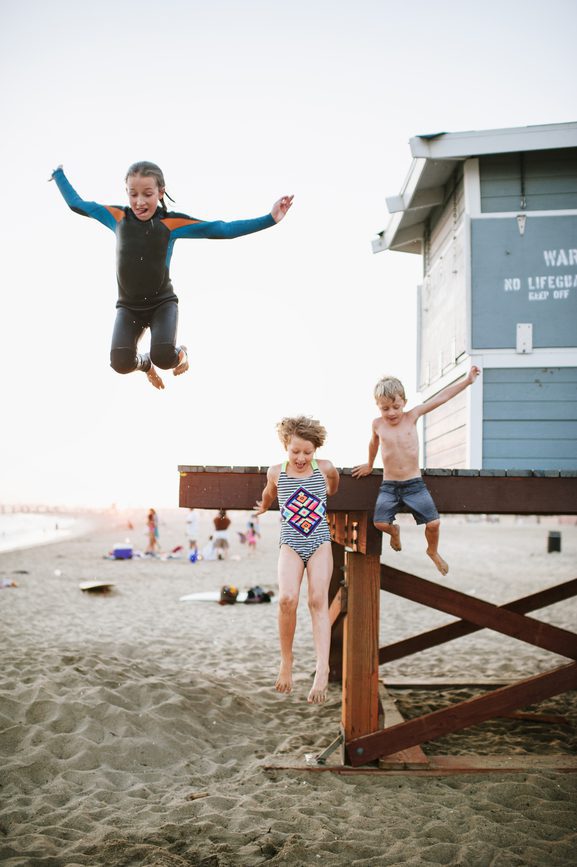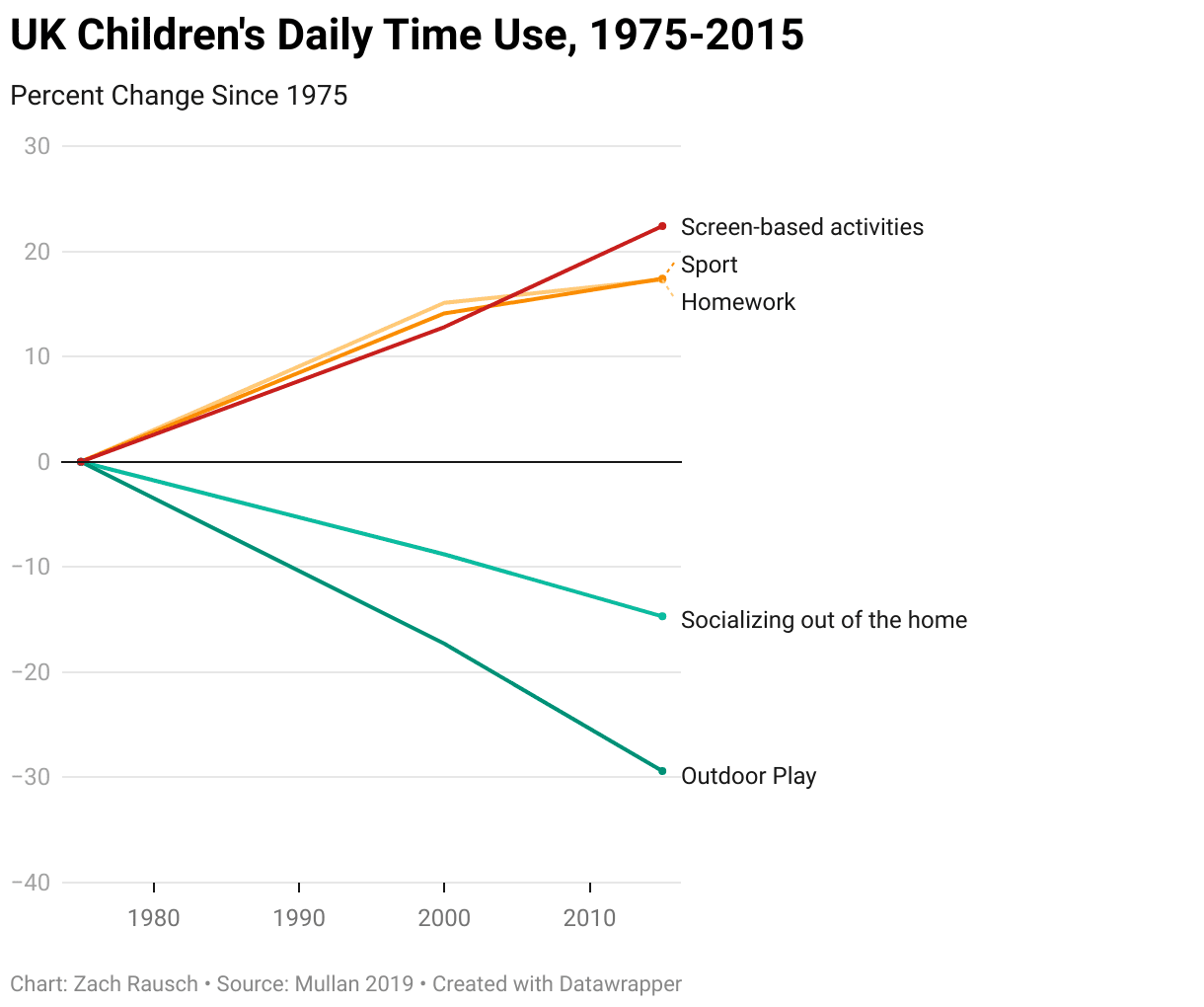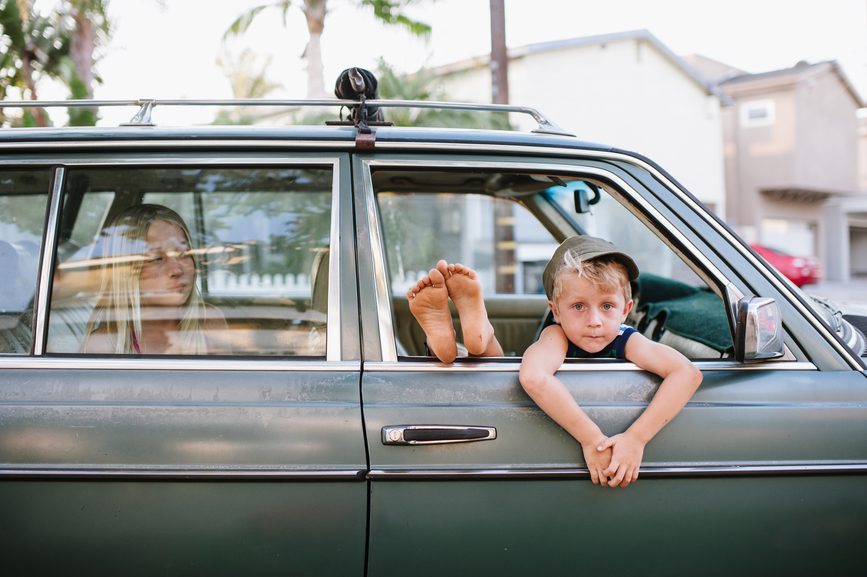“See you later mum, I’m riding my bike round to Sarah’s house!”
“Be back in time for dinner!”
“Okay, Bye!”
Out came your bike and you rode the few blocks to your friend’s house. You’d knock on the door, ask if she wanted to play, and your friend would come bounding out of the house calling to her own parents that you were both going out on your bikes. To where was unknown, but that was part of the adventure of childhood.
There was a level of trust in our child’s competence that has somewhat vanished today.
Together, you climbed trees, made nature forts, rode your bikes to the corner shop to pick up a bar of chocolate to share at the local park.
There were no mobile phones. No text messages to tell you your time was up. You and your friend were always (well, maybe not always!) home in time for dinner.
As you grew into teenagers, your freedom expanded as you caught the train into the city together, went to the cinema, tried on clothes you couldn’t yet afford and saved up for a new pair of 501’s.
As you grew into a young adult, your freedom expanded further as you moved out of home to the other side of the country to go to uni. You were fast thrust into life without the immediate safety net of the family unit. Or maybe you booked a one way flight for the gap year of your dreams with the promise of sending a postcard home when you arrived in any new place
Like concentric circles, your confidence, resilience and autonomy grew as your freedom expanded. You made decisions for yourself that were only yours to make, free from the influence of social media.
The World Has Changed
But, the world has changed since then; the framework provided for childhood and adolescence has shifted in the most dramatic of ways.
As parents, we need to recalibrate this framework and take responsibility for providing the conditions our children need to unfold into their full potential. A framework that allows children to grow into young adults who back themselves, who have an inner confidence that if they don’t know the answer they know they can figure it out.
Our job is to provide both a safety net and a launching pad and the bittersweet irony of parenting, is that one day, our kids will be all grown up and leave us. And when they do, we’ll know we’ve done our job when they confidently traverse the world with autonomy and find their way when they inevitably feel lost.
Only this isn’t what’s happening for kids today.
Collectively we’re failing children.
We’re overprotecting them in the real world and under protecting them online.
Young adults are leaving the nest with a fragile sense of self; one that easily crumbles in the face of criticism or difference of opinion.
They’ve grown up with algorithms feeding them myopic versions of the world in order to drive clicks, maintain the scroll, trigger the pixel, fragment their attention.
When faced with a complex, unpredictable and ever changing reality, their worlds are shaken in a way many of us born before the rise of social media and smartphones can’t fathom.
What we want is to raise kids who are open to and welcome debate. Kids who are willing to disagree with one another, and still maintain relationships. Kids who push back on cancel culture. Kids who recognise one of the most important forms of diversity is the diversity of opinion, of thought, and of free speech. Kids who have the courage to push beyond their comfort zones, and who are excited to break a few rules every now and then. But it seems that unfortunately, we’re doing the opposite.
Instead, our children and teens have become fragile. Delicate. Anxious.
Why? Why in the space of two decades have the group of people in our society who should be bold and brave, changing the world and debating injustice…why have they become a shell of previous generations?
In his paradigm-shifting new book, The Anxious Generation: How the Great Rewiring of Childhood Is Causing an Epidemic of Mental Illness, social psychologist Jonathon Haidt proposes that the great rewiring of childhood, through safetyism, smartphones and social media is to blame. This rewiring of childhood has stolen the experiences our kids need to mature emotionally and prepare them for the realities of the adult world. Jonathon accurately calls smartphones, ‘experience blockers’.
So, what is the great rewiring and what can we do about it? Let’s dive in.

How has childhood changed?
“For children, play is serious learning. It’s the work of childhood.”
Fred Rogers
Research unequivocally shows that play is vital for children to grow into well-rounded adults. Yet, play has vanished from our streets, been removed from the curriculum, and has all too often been sacrificed in the name of keeping kids ‘safe’.
Play has been rapidly replaced with something that we could argue keeps them much less safe.
A play-based childhood has been replaced with a phone-based childhood.
Freedom to explore and take age-appropriate risks have been stripped from childhood as parents now hand over a mini-computer in the form of a smartphone at younger and younger ages in fear of missing out.
Unfettered access to a digital world has the potential to harm kids so much more than freedom in the real world ever could.
In what he calls “the great rewiring of childhood” Haidt describes how children now spend up to nine hours daily on smartphones and social media, at the expense of healthy and necessary activities like hanging out in person, communicating face to face, being outside, sleeping, and exercising.
The switch from real world face-to-face interaction to online, screen-focused interaction has children missing out on the embodiment real-life interactions provide them with.
The impact? They go on to ultimately lack the vital social skills they need to traverse the wider world.

Four Fundamental Differences Between the Real and Virtual Worlds
In the Anxious Generation, Haidt points to four fundamental differences between experiences of the real and virtual worlds. They are:
1. Embodied vs Disembodied interactions: in real world interactions we use our whole bodies to communicate. We understand others and ourselves more accurately through body language, tone of voice and touch. We’re responsive to those we’re with. Virtual world interactions are disembodied, meaning that no “body” is needed; just language (or words) from another human or from artificial intelligence. In the virtual world, a touch of sarcasm or lighthearted banter can be easily misinterpreted without these embodied cues. Children cannot learn healthy social skills in the virtual world.
2. Synchronous vs Asynchronous: real world conversations take on a real time cadence, allowing for immediate feedback, turn taking, and adjusting our timing based on physical and emotional cues. Interactions in the virtual world are asynchronous and responses can be delayed. Therefore it is easy to be less empathetic and understanding.
3. One to One vs One to Many: real world interactions are usually one-to-one or one-to-a-few and only one interaction can happen at a time. The virtual world involves a substantial number of one-to-many communications. In the real world, it is by far easier for individuals to connect deeply and focus on the person in front of them. There aren’t multiple conversations happening simultaneously as they often do with online communication, leading to a fragmented presence which carries over into real-life interactions to the point that people start checking their phones mid-conversation.
4. Persistent vs Transient Social Settings: To get to know someone, to make and keep a friend, in the context of the real world it takes a high level of investment in relationships and a willingness to repair rifts when they occur. In short, it has a high bar for entry and exit. Socialisation in the virtual world is different – there is a low bar for entry and exit. People can block or cancel others. If something doesn’t resonate, it’s easy to high tail out of there rather than persist in understanding another’s perspective. Relationships may be seen as disposable.
Parents and Kids Have Had Enough: Four Simple Changes We Can Make
“Imagine if there was a toy introduced that would cause children to get less sleep, less exercise, and spend less time with other children. It would make them incredibly self-conscious and it would lower their self-esteem and cause depression and anxiety. That would be horrible, right? We’ve seen the loss of the play-based childhood, which kids have always had in favour of a phone-based childhood. Five years ago it was possible to say that the link between mental health and smartphones is just correlational, but that’s not true anymore. All evidence points to it.”
-Jonathon Haidt
In The Anxious Generation, Haidt proposes an alternative path forward – a path full of hope and optimism. Haidt argues that today’s children need their parents to unhook them from the screen-dependent childhood they find themselves within and recalibrate it to the type of childhood children lived for generations before – one that includes more independence in the real world and more opportunity to play.
“The two big (well-intentioned) mistakes we’ve made: overprotecting children in the real world (where they need to learn from vast quantities of independent real-world experience) and under-protecting them online (where many are being severely harmed, especially during their vulnerable years of early puberty).”
Jonathon Haidt
To rescue the declining mental health and wellbeing of our children, which we’ve discussed previously in the post “Smartphones, Kids and Inconvenient Truths: What Parents Need to Know”, Haidt calls for four new norms that parents need to rally behind together:
- No smartphones before high school
Haidt recommends that before high school it’s imperative to not hand over the deep well of information, misinformation, distraction and experience-blocking a smartphone promotes. Instead, he suggests providing children with a basic flip phone, or in an even more radical move, with nothing.
- No social media before 16
We all know the anxiety-inducing, comparison compelling and isolating effects of social media. Close your eyes and imagine for a moment having been immersed in this world before your brain was fully developed. Imagine that whatever happened at school followed you home. Imagine having no safe haven. Imagine the bombardment of unrealistic standards and expectations. Imagine going through puberty and the tenderness it brings while being under the looking glass of social media…a fast track to a mental health diagnosis.
Delaying access to social media until 16 at the earliest (and I’ve heard Jonathon suggest on a podcast interview, that 18 would be better…or never) allows children to get through puberty and for their brains to develop more before they enter the world of social media and perhaps have more ability to discern fact from fiction and develop healthy boundaries around tech.
- Phone free schools
In my husband’s home country, New Zealand, it has just become a regulation that children are no longer allowed to have smartphones at school. Unfortunately, the rest of the world is falling short. Haidt says schools need to ban phones to allow them to interact and talk to one another at recess rather than staring into their phones.
- More independence, free play and responsibility in the real world
Since the late 1970s societal trust has diminished and parents have become overprotective and fearful. This has led to less time spent with other children and less time spent outdoors. What it has been replaced with is crystal clear on the graph below.

Reference: https://www.anxiousgeneration.com/research/the-evidence
To learn how to become independent and self-governing kids need childhood returned to them.
They need free play and embodied activities, to once again start taking age-appropriate risks and learning about the world around them through experience. Returning this allows kids to naturally develop social skills, overcome anxiety, and become self-governing young adults.
Rallying together as parents
The strongest trees in the forest are those on its edges. Facing the elements. Weathering the storms.
In contrast, the weakest trees are often found in its centre. Protected from the harsh realities of nature.
Trees in the centre are the first to fall when a big storm hits.
Similarly, children who are overprotected and shielded from the real world crumble when challenges come their way. They haven’t had the practice they need to develop resilience, cultivate a strong sense of self, or handle adversity effectively.
As parents, we have a decision to make.
Are we going to allow the virtual world to steal our kids…from us? From themselves?
Or are we going to do everything in our power to ensure our kids stay in the real world? The real world that ensures they grow tall and strong and resilient.
Reading The Anxious Generation as a mother of a 10 year old boy made me feel angry. Sad. Disgusted. Empowered. Inspired. Riled up. Ready.
Ready to face big tech head on. Ready to be the wall that big tech won’t stand a chance of breaking through to get to my son. Ready to be the grownup my child needs and weather the storm that I know is coming my way.
Because I had a childhood that nurtured my resilience, my resolve, and my ability to stay connected to my intuition and know, research and evidence aside, that something about the great rewiring of childhood just doesn’t feel right.
Because when people behind closed corporate doors start studying how a child’s brain develops – not to ensure mental wellness or to promote emotional wellbeing – but to determine the best ways to hijack, manipulate, and take advantage of our kids’ immaturity…we’ve got a problem.
Because when big tech encourages 15-year-old boys to become addicted to porn, get an AI-chatbot girlfriend and hide from the world in their parents’ basement…we’ve got a problem.
Because when teen girls are losing 20 hours of their lives each week to the mind-bending, self-worth-stealing, empty space that is social media…we’ve got a problem.
Because, as I’ve learned from Dr. Gordon Neufeld, mother nature always has a plan. She has a way of ensuring kids mature as they grow. Childhood is a unique period of life that is meant to honour immaturity and nurture brain development.
The great rewiring of childhood disrupts mother nature’s plan – and the result – the anxious generation.
“It’s as though we sent Gen Z to grow up on Mars when we gave them smartphones in the early 2010s in the largest uncontrolled experiment humanity has ever performed on its own children.”
Jonathan Haidt
But one factor big tech hasn’t accounted for are parents.
And with his book, The Anxious Generation, Jonathan Haidt has opened parents’ eyes, wide open, to the risks we take if we don’t act. If we stand by, idly hoping for the best…we’ll have a problem.
My child won’t be a part of the largest uncontrolled experiment humanity has ever performed on its own children. And I don’t want yours to be either.
Everything we do as conscious parents is easier in community – but this – this is imperative that we act together.
That we unite on this topic and say NO. Not on my watch.
“Never doubt that a small group of thoughtful, committed citizens can change the world; indeed, it’s the only thing that ever has.”
Margaret Mead


Comments